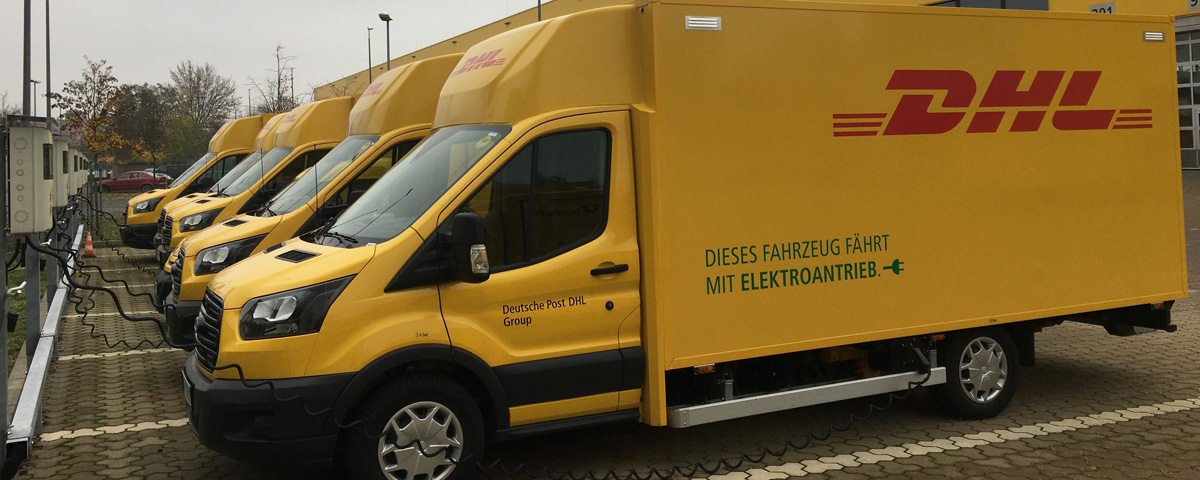Multiperiod Optimal Power Flow Problem in Distribution System Planning (Pedersen 2019)
9. December 2019
eGon
6. January 2020Intelligent networking of electric mobility and power grids – Research project launched

09.12.2019 | In a large practical trial with 63 StreetScooters WORK XL at a distribution centre of the Deutsche Post DHL Group (DPDHL) in Kleinmachnow near Berlin, the management of the loading processes from the network operator’s point of view is being tested for the first time. The aim is to develop procedures for intelligent network integration of the electrified transport sector.
Over a project period of three years, the research consortium is developing methods in the project “Intelligent grid integration of electrified logistics” (Netz_eLOG) to intelligently bring together the supply and demand of energy. The consortium consists of the consortium leader Reiner Lemoine Institut (RLI), the engineering partner IAV GmbH and E.DIS Netz GmbH. DPDHL is an associated partner in the project.
Flexibility potentials are becoming increasingly important through renewable energy
The storage units installed in electric vehicles offer enormous potential for flexibility, which is becoming increasingly important for grid operators as the volatile feed-in of renewable energies increases.
“We want to link the demand for electricity from electrified transport as intelligently as possible with the generation of electricity from renewable energies,” explains Oliver Arnhold, head of the RLI research area Mobility with Renewable Energies. “Fleet operators have so far had little incentive to take grid-side criteria into account when charging their vehicles. An important part of the project is therefore the workshops planned in the project for the development of economic incentive models. We invite all stakeholders to participate in this process”.
Robert Frase, Head of Department in the Thermodynamics & Power Systems unit at IAV: “Controllable grid loads are fundamental to avoid grid bottlenecks caused by the increasing use of electromobility. In the Netz_eLOG project, we are bringing together all the interfaces and will develop an interoperable software solution that controls an optimum grid load and ensures that the fleet is charged in line with demand”. Here, in addition to the primarily logistical criteria of the fleet operator, the requirements of the network operator must also be integrated into the control of the loading processes.
The amendment to the Grid Expansion Acceleration Act (NABEG 2.0) will make redispatch measures possible from October 2021 for generation plants with an output of 100 kW and remote-controlled plants, thus strengthening the role of the distribution grid operators. In the future, this will also include large electric vehicle fleets. In the “Redispatch 2.0” project, BDEW is working on an industry solution for implementing the legal requirements of NABEG 2.0. The Netz_eLOG project offers the opportunity to test these future requirements in advance using the example of a large electric fleet.
Harald Bock, Managing Director of E.DIS Netz GmbH, explains: “In the research project, we can already develop processes today and test them in real operation, which is urgently needed for the coming market ramp-up and which ensure that electric mobility will contribute to grid stability in the future”.
Simulation model allows analysis of different locations and scenarios
In Netz_eLOG, in addition to the development and testing of the software in real on-site operation, various scenarios are being simulated, such as the use of local renewable energy or stationary battery storage. In addition, transferability scenarios will be used to investigate the application to other traffic areas, such as public transport, the housing industry or P+R car parks. The goal of the investigations is to enable network operators to assess the flexibility options for a specific location as well as for the broad application of intelligent charge control and to incorporate this into future network planning. At the end of the project, the simulation model will be made available to the scientific community under an open license in accordance with the Open Science Policy of the Reiner Lemoine Institute.
Netz_eLOG is funded by the Federal Ministry for the Environment, Nature Conservation and Nuclear Safety (BMU) within the framework of the “Erneuerbar Mobil” funding programme. It is coordinated by the VDI/VDE-IT.
Further information about the project and its contents can be found on the project page.
© Image: Deutsche Post Group DHL (DPDHL)




